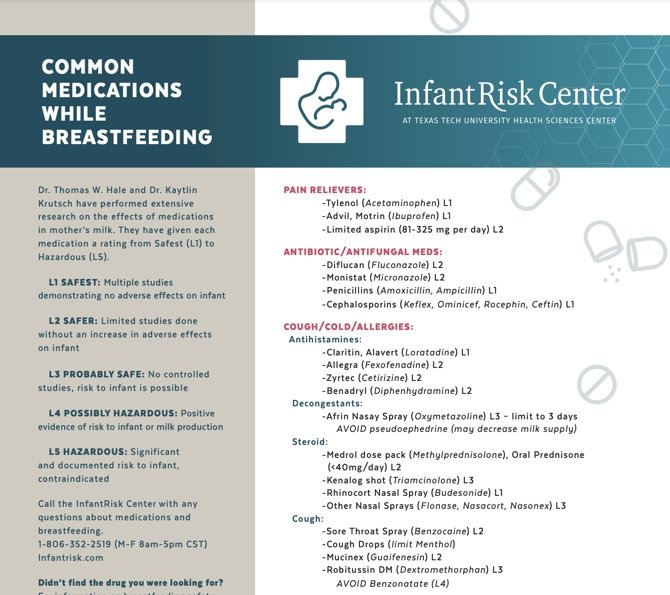Breastfeeding during illness.
Winter is here, and along with it, a vast array of germs. For most families with young children, illness is just a fact of life at this time of year. How does illness affect breastfeeding and how does breastfeeding affect illness? Let’s dive in.
Breastmilk is a living substance, and it changes to meet the needs of your child.
Let’s say that your child goes to daycare and gets exposed to a virus, then comes home later and breastfeeds. Your child’s saliva will tell your breasts to make cells to fight that virus. Several hours later, specific antibodies will be present in your milk. Wild, right?
Your child may still get sick, but the illness is likely to be milder or shorter due to the presence of those antibodies. Breastmilk has many functions, one of which is medicine.
What happens when a breastfeeding child gets sick?
Usually it means more breastfeeding. Your little one is seeking comfort as well as an increase in hydration and more of those lovely antibodies. Cue the cluster feeding.
At times it can be the opposite. Some babies will feel too blah to nurse as much as they used to. Continue offering, and keep an eye on their diapers to be sure they are keeping up with hydration. If your child isn’t feeding much, you may need to add in some pumping to keep your milk production up.
Either way, your child will need more from you, so as much as possible, turn off other responsibilities. Take time off work if you’re able. Ask a friend or family member to bring you a pot of soup or a casserole, or run errands for you, or walk your dog. This is not a time when you’ll be getting a lot of other things done, but it won’t last forever.
Besides meeting your child’s needs during illness, resting at home will allow you to fight the virus for yourself. You’re much more likely to get sick yourself if you’re running yourself into the ground.
Sometimes babies have difficulty breastfeeding during illness, especially when it’s the respiratory variety. If their nose is all plugged up, it may be hard to breathe when breastfeeding.
Here are some tips for these situations:
use a humidifier
use a saline spray/mist before feedings
nasal suctioning after saline spray (try to limit this as it can cause irritation and swelling)
try upright positions such as koala hold
expect shorter, more frequent feeds
expect your baby to need frequent breaks to breathe
What if you get sick?
First of all, it’s completely safe to continue breastfeeding when you’re sick. Remember those lovely antibodies you made when your child came home from daycare? Now that you’re sick, your milk is full of virus fighters to help your baby battle your germs.
When you’re sick, your body may have a harder time making milk since a lot of energy is now going towards fighting a bug. The solution? You guessed it…REST. Use those sick days…even if you feel like you’re not sick enough to call in. You’ll get better faster if you rest, and your milk supply has a better chance of keeping up with your baby.
This is not a time to be trying to get extra milk into the freezer. Focus on resting and feeding your baby. Your supply will increase once you’re feeling better.
In addition to rest, make sure you’re eating and drinking well. That means quality food and drink, such as broth, foods and drinks with inflammation-fighters like ginger, garlic and tumeric, lots of protein, and plenty of electrolytes.
What medications are safe to take when breastfeeding?
The good news is that most medications are perfectly safe. There are a lot of factors that influence how much of something passes into breastmilk, and all medications are different. The safest course of action when you’re starting a new medication during lactation, is to check into the research. Don’t worry - it’s actually pretty easy and I’ll show you how.
One of the best sources for new data in this field is coming out of The Infant Risk Center at Texas Tech University. Their website has helpful articles on drugs, and their call center handles specific calls from lactating parents regarding medication safety. This article from their website called “Cough & Cold Medications when Breastfeeding”, is a great resource for any lactating parent. They also have an app called “Mommy Meds” which helps you easily access information on medication safety.
Unfortunately, you probably shouldn’t rely on your doctor or midwife to inform you about medication safety during lactation. Unless they have specifically sought out education on this topic, they are not likely to be up to date.
One of the medications that a lot of people reach for when they have a head cold is Sudafed. This is one that I discourage taking during lactation, not because it isn’t safe for your baby, but because it has been shown to decrease milk production for some people. I would also recommend staying away from peppermint tea for the same reason.
Despite your best efforts, your milk production may decrease during a time of illness. It’s likely to return to normal once you’re well again. If you have questions or concerns about your production, it’s always a good idea to reach out to a lactation consultant.
With resources like Infant Risk Center, as well as support people you can call on, and lots of rest and nourishment, you’ll make it through the dark and germy days of winter to see another spring!




